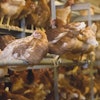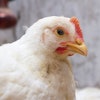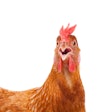I would have a really hard time lying about who I was, my work history and why I am interested in working on a livestock or poultry farm or processing facility. It just isn’t in my makeup. Even as a kid, I was never a good liar. So, I was a little surprised that when two veteran animal rights undercover video activists told the audience at Farm Animal Rights’ National Animal Rights Conference this summer about their “exploits,” they didn’t mention any stress or strain to their consciences brought about by their deception. Instead, they complained about the hard work on the farm.
According to reporting by staffers of the Animal Agriculture Alliance who attended the meeting, Taylor Radig, former undercover activist, complained that when working for the Quanah Cattle Company she had to work 12- to 14-hour long, hard, laborious days. It was “hard, back-breaking” work where white females were rare. She mentioned that while working there she was asked if she was an “undercover boss” and where she was hiding the camera, but she made no mention of any concern about lying about the presence of the camera.
TJ Tumasse, another former undercover activist, complained of being cut open, chemically burned, experiencing heat exhaustion, being rammed, bitten and also working with broken ribs while employed at roadside zoos, animal shelters and “factory farms.” But, he said it was “nothing compared to the suffering of the animals every day.” There was mention of any nagging doubts over possibly lying to get the jobs or violating company policies against making video recordings, but there were complaints about the hard work.
I can only speculate as to why these two former undercover operatives seem unconcerned by their deceit; perhaps they have the moral clarity that only comes with being a true believer.
Other speakers were more than happy to articulate what the animal rights movement means to them. Simone Reyes, animal rights activist and assistant to Russell Simmons, said, “Animal rights is the final frontier.” She said that animal activists “won’t stop until we complete our goal of total and complete animal liberation.” She said that the animal rights movement needs to join other social movements because “no one is free while others are suppressed.” Activists should “ask other social movements to marry the animal rights movement to their own agenda.”
Reyes spoke of early gay rights supporters working in the marriage license offices who would cross out the “not needed man or woman [pronoun] and write in person.” She then commented, “Can’t we envision the day where we cross out the word person and put the word “being” in its place.” If that day comes, I just hope that the license would only be made out for just two "beings" and that they would both still be human.
There is nothing like having moral clarity, except of course when you have it and are wrong. I think many animal rights activists are just dead wrong. They think it is immoral to practice speciesism, which is to discriminate against animals in favor of humans. I think it is immoral to equate animal life with human life, which by the way is also how most of the world’s major religions view the relationship between man and animals.


















